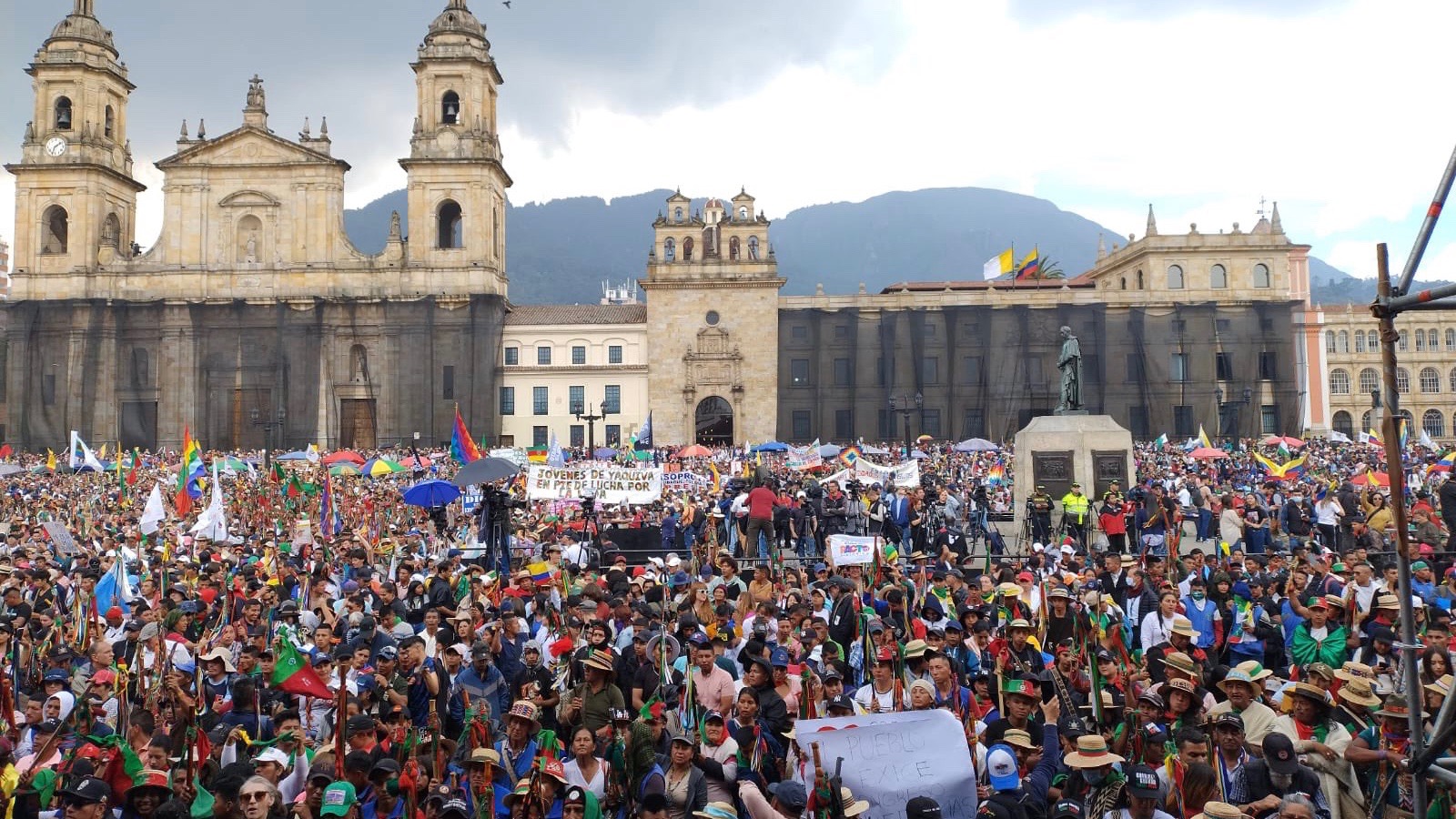Over 15,000 Indigenous people from 10 departments of Colombia arrived in the capital Bogotá between September 25 and 27 to draw the national government’s attention to the humanitarian crisis faced by Indigenous communities in their territories due to paramilitary violence.
On Wednesday, September 27, they held a massive march from Street 60 to the Bolivar Plaza via highway no.7, demanding that the government of President Gustavo Petro implement immediate measures to end violence in their territories and stop the assassination of community and social leaders. They also demanded respect for the right to territory and self-determination of the Indigenous and Afro-descendent communities.
The protesters, who were joined by members of various social organizations and trade unions, also expressed their support for the various social reforms presented by the Petro government in the Congress that seek to transform the social reality of the country. Thousands of demonstrators vowed to work together with the national government to eradicate violence and consolidate peace in the country.
#27Septiembre Nos movilizamos para proteger los sistemas de conocimiento propio de nuestros pueblos indígenas y defender las reformas estructurales que protegen la vida.
Seguimos caminando para cuidar ese aire de vida, esa palabra de vida para volver al origen. #indigena #onic… pic.twitter.com/lUL0xb3u7w
— Orlando Rayo Acosta (@OrlandoRayo_) September 27, 2023
Joe Sauca, a senior advisor of the Regional Indigenous Council of Cauca (CRIC), in conversation with WRadio said that “it is necessary to raise these issues so that there is progress towards a national agreement that truly leads to total peace with the reforms that the national government is implementing.”
Luis Zapata, national coordinator of the National Indigenous Organization of Colombia (ONIC), pointed out that the mobilization aims to reiterate that “Indigenous people are not violent” and that “the Indigenous Guardia is an organization of peace and defender of life.”
Professor Margarita Duarte told Colombia Informa from the streets of Bogotá that “Colombians have taken to the streets in support of the Petro government, not because as the hegemonic media says it is paying us and forcing us, but because this government is trying to implement the reforms of change. Without reforms, there can be no changes. We are demanding that the Congress approve the reforms of change, the health, pension and labor reforms as well as the education reforms.”
#MarchaHistorica✊Avanza la marcha en Bogotá. Manifestantes apoyan reformas del gobierno. #27SPorLaVida pic.twitter.com/KTguhRRyF0
— Colombia Informa (@Col_Informa) September 27, 2023
The march was organized as part of the ‘Social Minga for the defense of life, territory, justice, democracy and peace,’ which was called for by more than 50 Indigenous, peasant, and social organizations from the southwest of Colombia. Southwestern departments of Colombia are the hardest hit regions from internal armed conflict in the country. Minga is an Indigenous Quechua word and refers to collective action for the benefit of the community.
The action received the support of the national government, who instructed the police and the Bogotá Mayor’s Office to work together to provide washrooms and cooking spaces to the communities, who are temporarily residing in tents set-up at the Tercer Milenio park, as well as guarantee their safety.
“We have violence because we have deep inequality”
On Wednesday September 27, Petro addressed the multitude gathered in the Bolívar Plaza, and announced that he would present to Congress a bill to reform the public services in Colombia to achieve peace and social justice in the country.
“We are going to present the reform of Colombia’s public services. The laws in force today that created public services put the businessman in a privileged place, but they left the user on the street,” said the president.
The head of state pointed out that under the current model “the users have no rights before the public service, because the rates are set according to the profitability of a few businessmen, but our intention is to change that.”
“We believe that the public services must have the user at the center of its heart to ensure the population the minimum vital services of electricity, drinking water and sewage,” he added.
This reform will be added to that of health that establishes “healthcare as a universal right;” the labor that ensures that “in Colombia there is decent work;” the educational one that “seeks to enable young people to enter university;” and the pension one that make sure o”ld men and women have food and a pension bonus that allows them to have the affection of their family, not die alone.”
“In all of these reforms there is social justice. I am convinced that we have violence because we are deeply unequal, the fourth most unequal country on the planet Earth. We are terrifyingly unequal as a society, the distance between those who have the most and those who have the least is enormous. These inequalities cause violence, drug trafficking and the emergence of guerrillas. This is why our objective is to achieve social justice to achieve peace,” stressed Petro.





